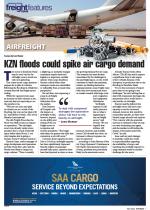The storm in KwaZulu-Natal may be over, but for the airfreight sector, clouds are only now gathering.This comes as air cargo operators prepare for a spike in volumes following the f looding in eThekwini recently that left the freight sector reeling.While few operators have seen an increase in their volumes as yet, most say they are expecting to see the numbers rise.“We have not seen any spike in volumes yet as a result of the f looding, but you can bet there will be,” said Milton French, CEO of Air Menzies International.He told Freight News that the f lood was likely to have an impact on operations. “The airfreight sector was already under severe pressure due to a lack of aircraft space before these f loods. I can only imagine this is going to become worse if volumes increase.”Ricardo Isaac, senior manager of cargo development and operations at Dube Trade Port, also said the f loods were likely to impact air cargo volumes. “There is usually a slight lag, as modality changes sometimes require back-end logistics as importers consider options when cargo deadlines become critical when other transport modes are unavailable or unfeasible from a transit time perspective.”He said they were expecting a surge in airfreight based on early indications from the market.Paul Danvers of Groupair said the impact on airfreight would, however, depend on the ability and timing of the sea freight sector to reorganise and resume operations. “The longer that takes, the greater the odds that conversion to air will occur.”Concerns about capacity do exist. Due to Covid-19, airfreight capacity has been significantly impacted. Heavily reliant on passenger aircraft belly space, operators have been hard-pressed at times to meet the growing demand for air cargo. The situation has been further exacerbated by the challenges in the sea freight space. As the world continues to battle the pandemic, traders are finding themselves paying premium ocean freight rates with very slow turnaround times as vessels contend with large-scale port congestion and equipment imbalances.“Airfreight capacity is still under pressure due to what is happening in the sea freight sector,” said French. “We are hopeful that airlines will increase rotations and possibly insert CAO aircraft into slots. An increase in charter requests can also be expected.”According to John Murray of the Air Cargo Operators’ Committee at OR Tambo International Airport (Ortia), problems are particularly likely in the automotive sector.Already Toyota South Africa Motors (TSAM) has said it expects a significant drop in the output of new vehicles because of the disruption in production due to the f looding in KwaZulu-Natal“It is in the movement of export parts that we are going to see challenges,” he said, adding that to deal with component shortages the automotive sector would have to rely heavily on airfreight.Danvers said he believed the airfreight sector did have some capacity to service increased demand, however, this would be commodity-specific, as there were limited cargo-aircraft-only options. “Our concern with the potential increase in demand is that we may see rates increasing once again, and the market is still feeling the impact of increased rates from Covid,” he said.Isaac said any such changes in modality could also result in unpredictability regarding the availability of cargo, and matching the available capacity to cargo demand would be another challenge for the sector.

